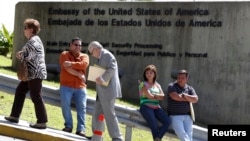CARACAS —
The U.S. Embassy in Venezuela on Tuesday defended three diplomats expelled by President Nicolas Maduro, rejecting charges they were involved in espionage and accusations Washington is trying to destabilize the OPEC nation.
In the latest spat between the ideological foes, Maduro on Monday ordered out three U.S. diplomats including Kelly Keiderling, temporarily in charge of the mission.
He alleged they had been meeting with “right wing” opposition leaders and encouraging acts of sabotage against the South American nation's electricity grid and economy.
The expulsions throw a wrench into cautious efforts this year to restore full diplomatic ties that were frayed for most of the 14-year rule of late socialist leader Hugo Chavez.
The U.S. government was evaluating its response and may take reciprocal action in accordance with the Vienna Convention on diplomatic relations, a statement from the embassy said.
“We completely reject the Venezuelan government's allegations of U.S. government involvement in any type of conspiracy to destabilize the Venezuelan government,” it added.
“We likewise reject the specific claims against the three members of our embassy.”
In an address to the nation, Maduro repeated his accusations on Tuesday, saying the three Americans had been handing over money and stirring up plots in southeastern Bolivar state.
“You can see the hand of the gringo conspiracy ... they talk of a Benghazi,” Maduro said, referring to the cradle of revolt against late Libyan leader Moammer Gadhafi.
Maduro showed a video of the three in a special TV broadcast all local channels were obliged to show live.
To a backdrop of dramatic music, the video showed images of diplomatic vehicles, a flight manifest and the three diplomats entering and departing what appeared to be offices of pro-opposition groups in Bolivar.
“Until the U.S. government understands it has to respect Venezuela as a sovereign nation, quite simply there will be no cordial relations, nor cordial communications,” Maduro said.
The U.S. Embassy statement said the diplomats were in Bolivar state on entirely “normal” business.
“We maintain regular contacts across the Venezuelan political spectrum,” it said.
“This is what diplomats do. Venezuelan diplomats in the United States similarly meet with a broad range of representatives of our society.”
Maduro, who is Chavez's successor and part of a Latin American leftist alliance including Cuba, Bolivia, Nicaragua and Ecuador, named a new acting head of Venezuela's U.S. diplomatic mission shortly after his April election.
Many took that as a sign of warming relations.
That official may now face expulsion in the tit-for-tat style retaliation that has characterized similar incidents in the past.
Chavez in 2008 expelled Ambassador Patrick Duddy over what he called Washington's involvement in violent protests in Bolivia. In 2010, he blocked the nomination of diplomat Larry Palmer over comments that there were “clear ties” between members of Chavez's government and leftist Colombian rebels.
Venezuela's opposition says Maduro is continuing a Chavez-era tactic of inflating and inventing diplomatic crises to distract attention from economic and social problems affecting the nation's 29 million people.
In the latest spat between the ideological foes, Maduro on Monday ordered out three U.S. diplomats including Kelly Keiderling, temporarily in charge of the mission.
He alleged they had been meeting with “right wing” opposition leaders and encouraging acts of sabotage against the South American nation's electricity grid and economy.
The expulsions throw a wrench into cautious efforts this year to restore full diplomatic ties that were frayed for most of the 14-year rule of late socialist leader Hugo Chavez.
The U.S. government was evaluating its response and may take reciprocal action in accordance with the Vienna Convention on diplomatic relations, a statement from the embassy said.
“We completely reject the Venezuelan government's allegations of U.S. government involvement in any type of conspiracy to destabilize the Venezuelan government,” it added.
“We likewise reject the specific claims against the three members of our embassy.”
In an address to the nation, Maduro repeated his accusations on Tuesday, saying the three Americans had been handing over money and stirring up plots in southeastern Bolivar state.
“You can see the hand of the gringo conspiracy ... they talk of a Benghazi,” Maduro said, referring to the cradle of revolt against late Libyan leader Moammer Gadhafi.
Maduro showed a video of the three in a special TV broadcast all local channels were obliged to show live.
To a backdrop of dramatic music, the video showed images of diplomatic vehicles, a flight manifest and the three diplomats entering and departing what appeared to be offices of pro-opposition groups in Bolivar.
“Until the U.S. government understands it has to respect Venezuela as a sovereign nation, quite simply there will be no cordial relations, nor cordial communications,” Maduro said.
The U.S. Embassy statement said the diplomats were in Bolivar state on entirely “normal” business.
“We maintain regular contacts across the Venezuelan political spectrum,” it said.
“This is what diplomats do. Venezuelan diplomats in the United States similarly meet with a broad range of representatives of our society.”
Maduro, who is Chavez's successor and part of a Latin American leftist alliance including Cuba, Bolivia, Nicaragua and Ecuador, named a new acting head of Venezuela's U.S. diplomatic mission shortly after his April election.
Many took that as a sign of warming relations.
That official may now face expulsion in the tit-for-tat style retaliation that has characterized similar incidents in the past.
Chavez in 2008 expelled Ambassador Patrick Duddy over what he called Washington's involvement in violent protests in Bolivia. In 2010, he blocked the nomination of diplomat Larry Palmer over comments that there were “clear ties” between members of Chavez's government and leftist Colombian rebels.
Venezuela's opposition says Maduro is continuing a Chavez-era tactic of inflating and inventing diplomatic crises to distract attention from economic and social problems affecting the nation's 29 million people.










